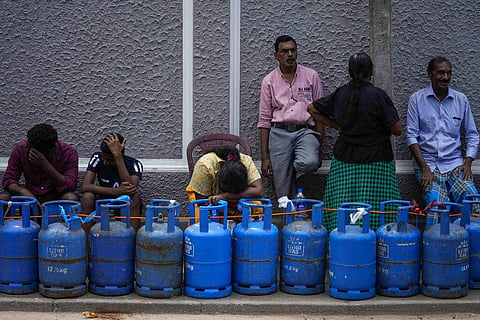

BEIJING: The economic and political chaos gripping Sri Lanka and the fall of the Rajapaksa brothers, who backed massive Chinese projects for over two decades in the strategically located island nation will have a "big impact" on Beijing's close ties with Colombo besides investments, experts have warned.
Last week, thousands of irate protesters stormed the official residence of embattled President Gotabaya Rajapaksa and forced him to offer his resignation on Wednesday.
President Rajapaksa would resign on July 13, Parliament Speaker Mahinda Yapa Abeywardena said on Saturday night, while Prime Minister Wickremesinghe has already expressed his willingness to resign.
With his elder brother and former Prime Minister Mahinda Rajapaksa also resigning two months ago, the crisis could be a blow to the China-Lanka ties, Lin Minwang, a South Asia expert at Fudan University in Shanghai said.
The latest political turmoil comes after months of protests over the financial crisis and will be a blow to China's ties with the island nation, the Hong Kong-based South China Morning Post quoted Lin as saying on Tuesday.
The Rajapaksa family, headed by Mahinda Rajapaksa, which has dominated Sri Lankan politics for nearly two decades, was considered friendly to Beijing.
When Mahinda Gotabaya's older brother was in power from 2005 to 2015, he opened up Sri Lanka, which values for its strategic location in the Indian Ocean to massive Chinese projects including the Hambantota port, which China obtained for 99-year deal as part of a controversial debt-for-equity swap besides the unfinished Colombo port project being built on reclaimed land from the sea.
"In the short run, there will be a big impact on China's relations with Sri Lanka because the influence of the Rajapaksa family in Sri Lanka's political circles will be undermined and a political comeback will be unlikely in the near future," Lin said.
He said the crisis, driven by soaring inflation, high debt and economic mismanagement, was also a "reminder" for Chinese investors looking to developing nations that are vulnerable to increasing fuel costs, food shortages and rising US interest rates.
"I won't call it a lesson but it is a reminder that local governance competence should be taken into consideration when investing overseas, especially when the overall international environment is not good and given that the debt ratio of countries in South Asia is generally very high," Lin said.
"Chinese investments [in Sri Lanka] will suffer some losses," he added.
But Liu Zongyi, a senior fellow with the Shanghai Institutes for International Studies, said Beijing had maintained "friendly relationships not just with the Rajapaksa family but every political party in Sri Lanka."
"China is not leaning towards one faction or the other," Liu said.
"That's why the previous Sri Lankan governments have all wanted to maintain friendly and cooperative ties with China."
Lin also said that over the long term, Sri Lanka would be unlikely to move away from China, one of its biggest creditors and a key foreign investor in the nation.
"There is no need to be too pessimistic about China-Sri Lanka relations, because Sri Lanka's relationship with India has its inherent structural contradictions, and Sri Lanka actually needs a country like China as a counterbalance with India," Lin said.
The Chinese Foreign Ministry has said that China is closely following the latest developments in Sri Lanka.
"As a friendly neighbour and cooperation partner, we sincerely hope that all sectors in Sri Lanka could bear in mind the fundamental interests of their country and people and work together in solidarity to overcome the current difficulties and strive to restore stability, revitalise the economy and improve people's livelihoods at an early date," Chinese Foreign Ministry spokesman Wang Wenbin told a media briefing here on Monday.
On Saturday, the Chinese embassy in Colombo asked Chinese nationals not to participate in or watch any protests after thousands of protesters stormed and occupied the presidential palace and set the Sri Lankan prime minister's private residence on fire.
The embassy issued a notice on Saturday, reminding Chinese nationals in Sri Lanka to pay close attention to the local security situation and abide by local laws and regulations after the protests spread, state-run Global Times reported.
During the current crisis, China has provided USD over 33 million dollars of aid and recently sent a large shipment of rice but for inexplicable reasons did not provide the large-scale monetary assistance sought by the Rajapaksas and their pleas to defer repayment of Chinese loans.
Following the economic crisis, Sri Lanka also defaulted on USD 51 billion in foreign debt which included Chinese loans.
For its part, state-run Global Times in its editorial on the Sri Lankan crisis on Tuesday said "the US and West should not have twisted excitement toward the Sri Lanka crisis" asserting that the crisis was not caused by Colombo's debt to Beijing.
"Sri Lanka is already scarred and cannot bear the pressure and cost of becoming a geopolitical arena. Many research reports have repeatedly demonstrated that Sri Lanka's current debt crisis is not directly related to Chinese-funded infrastructure investment. Bilateral foreign debt to China only accounts for 10 per cent of Sri Lanka's total outstanding foreign debt", it said.
"Western countries' commercial creditors and multilateral financial institutions are responsible for Sri Lanka's foreign debt," it said.
"The "national bankruptcy" crisis facing Sri Lanka is essentially triggered by global development and governance deficits. The regional security crisis exacerbated by the US and the West has deepened the global development crisis", it said, hoping that the US and western countries "can restrain their geopolitical impulses to indulge in great power competition."